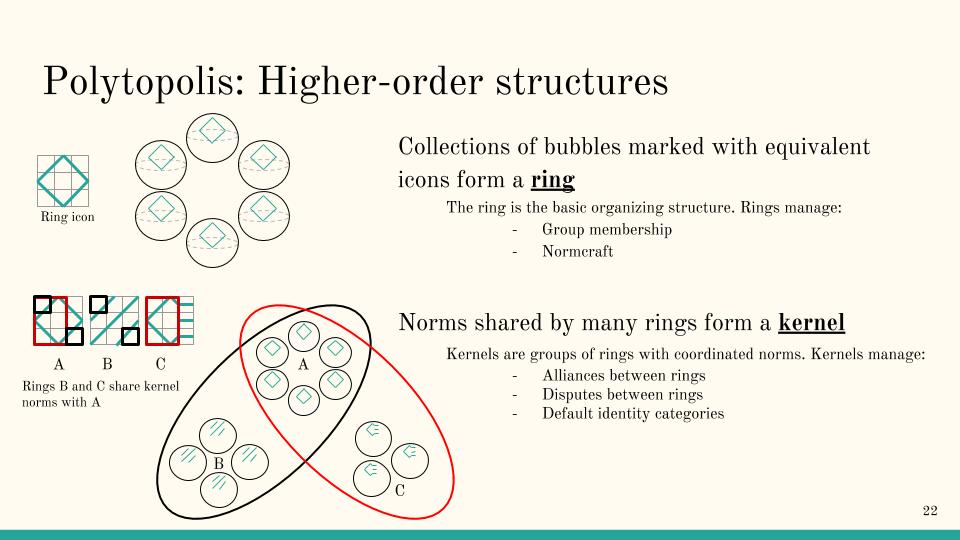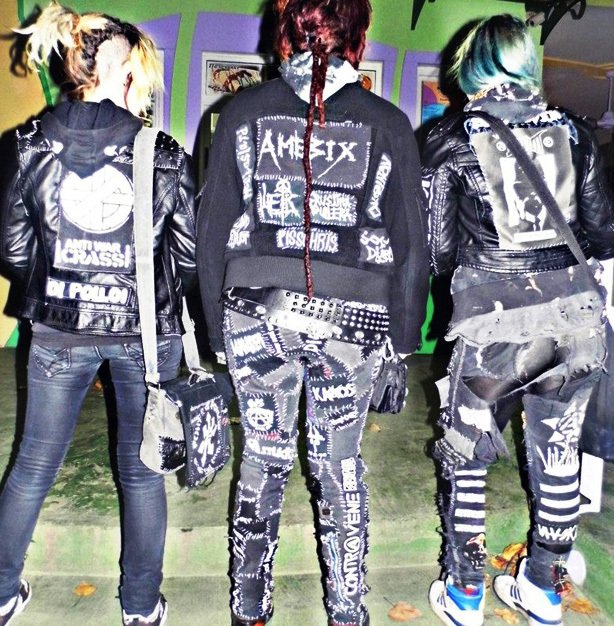(Thread) A few years ago I came up with a system of distributed governance designed to systematize the consensus process at global scales.
The proposal was called Polytopolis: a city of many spaces https://docs.google.com/presentation/d/10mKpeBpj0i009x05jA5iAsL-FpKsBkAyHy7ICheNFOc/edit?usp=sharing">https://docs.google.com/presentat...
The proposal was called Polytopolis: a city of many spaces https://docs.google.com/presentation/d/10mKpeBpj0i009x05jA5iAsL-FpKsBkAyHy7ICheNFOc/edit?usp=sharing">https://docs.google.com/presentat...
At the time I tried to explain the proposal abstractly with diagrams and analogies to network theory. It didn& #39;t go so well. I& #39;d like to try a simpler analogy.
Imagine a world where the use of currency was replaced with a system of jackets and patches. Groups of any size and composition can distribute patches to their members on whatever basis they choose.
Individuals wear jackets covered in patches representing their various affiliations. Literally wearing their alliances on their sleeves. Strangers can discover elaborate pre-existing relationships simply by reviewing each other& #39;s jackets.
The socio-economic model is generally a participatory sharing economy, with the patch system serving as distributed political infrastructure enabling participants to track what they owe and might expect from each other at scale.
https://en.wikipedia.org/wiki/Participatory_economics">https://en.wikipedia.org/wiki/Part...
https://en.wikipedia.org/wiki/Participatory_economics">https://en.wikipedia.org/wiki/Part...
Some groups I contribute to generously and take from freely (eg, my immediate family). Others I give to and take from more cautiously, still others not at all. Patches let us make informed decisions in a large scale sharing economy.
Rather than supporting myself by earning wages, my primary task in Polytopolis is to forge a stable set of social alliances (collect patches) that provide access to the the support and resources I want.
In Polytopolis, you are indexed by your network of alliances. A large enough collection of patches (some of which are kept secure) can have enough entropy to identify everyone uniquely, and can work as a "password" to access the resources of specific groups.
I& #39;m imagining some baseline social safety net which everyone contributes to as supplies a basic standard of living for all people, but free association to develop niche communities beyond the generic default.
So every warm body is guaranteed a meal at the food distro center, but my local co-op serves much better food and I get to wear their patch and eat their food if I volunteer in their garden 3 hours a week. And so on.
I assume that sufficiently small groups are able to manage an internal sharing economy without significant infrastructural support. A close group of friends, for instance, can share among themselves without technical assistance.
Above that threshold, Polytopolis facilitates consensus-building by standardizing the patch system. Groups can build patches of any design, but the patches and jackets are all developed around a uniform pixelated grid so they can be treated with digital precision.
Specifically, patches can be designed fractionally and can be composed of groups of patches, and so can represent *coalitions* of alliances. We can tell from a glance at our patches that we occupy different niches within a big tent alliance.
Dynamically, Polytopolis works similarly to the use of pheromones in ant colonies. Ants can sniff each other and immediately identify other colony members, and what role they are serving for the colony. Ants decide what to do by situating themselves in the workload of other ants.
Money is a signal of status, but it& #39;s one-dimensional. It& #39;s a scalar value. We can think of Polytopolis as an N-dimensional value system, facilitating a more robust exchange of value and division of labor. More like ant colonies. Sustainable anarchy at evolutionary scale.
Polytopolis functions as a distributed governance system by efficiently routing disputes to the nearest groups with an immediate interest in resolution. If you and I disagree, we might appeal to the coalition representing our common alliances to adjudicate the dispute.
The digital patch system allows us to quickly find the largest such coalition with a stake in resolving our dispute. They might decide in your favor or mine, or the groups involved might rework their patch-distribution system to clarify the dispute for all parties.
The point is that the nature of such a resolution can be standardized and tailored to the specific nature of the dispute and the interests of the parties involved, without necessarily channeling all disputes through a centralized government bottleneck.
The system can work without requiring people to actually wear the patches. Imagine something between a cell phone and a credit card with which I can selectively display alliances to others like a membership pass. Decentralized Sesame Credit.
The proposal has the nice consequence that it can sit on top of the existing network of alliances we inherit from late-stage capitalism. Being a US Citizen, being a human covered by the UDHR, being a shareholder of Citibank: these are just patches. Put them on the grid.
Polytopolis doesn& #39;t require building new groups from scratch. Polytopolis just standardizes a framework for managing my myriad group relationships and their sociopolitical and economic implications. It& #39;s a 21st century khipu.
http://khipukamayuq.fas.harvard.edu/ ">https://khipukamayuq.fas.harvard.edu/">...
http://khipukamayuq.fas.harvard.edu/ ">https://khipukamayuq.fas.harvard.edu/">...
See Deborah Gordon on ants. /end https://www.youtube.com/watch?v=ukS4UjCauUs">https://www.youtube.com/watch...

 Read on Twitter
Read on Twitter





